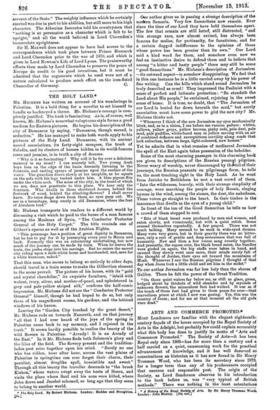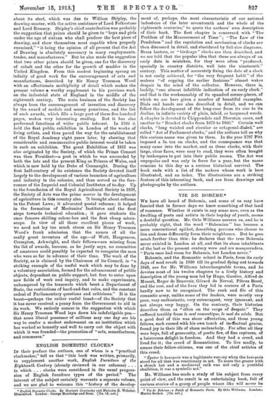ARTS AND COMMERCE PROMOTED.*
• The Holy Land. By Hobert Hichens. London : Hodder and Stoughton. • A History of the Boyd &Arty of Arta. By Sir Henry Truman Wood. MosT Londoners are familiar with the elegant eighteentli century façade of the house occupied by the Royal Society of Ails in the Adelphi, but probably few could explain accurately *bat this body has done to justify its motto of "Arts and Commerce Promoted." The Society of Arts—it has been Royal only since 1908—has for more than a century and a half carried on a quiet, unassuming work for the practical advanceinent of knowledge, and it has well deserved ad conscientious an historian as it has now found in Sir Henry' Trueman Wood, who has been its tecretary since 1879, forfora longer term than any of his predecessors occupied that onerous and responsible post. 'the origin of the Society, as Lord Sanderson observes in his introduction to the book before us, was " very typical of British methods." There was nothing in the least ostentationt about its start, which *as due to Willie& Shipley, the drawing-master, with the active assistance of Lord Folkestone and Lord Romney. Shipley's chief contribution was probably the suggestion that prizes should be given to "boys and girls under the age of sixteen who shall produce the best piece of drawing, and show themselves most capable when properly examined," " it being the opinion of all present that the Art of Drawing is absolutely necessary in many employments, trades, and manufactures." But he also made the suggestion that two other prizes should be given, one for the discovery of cobalt and the other for the growth of madder in the United Kingdom. From this modest beginning sprang an infinity of good work for the encouragement of arts and manufactures, described by Sir Henry Trueman Wood with an affectionate multiplicity of detail which makes the present volume a worthy supplement to his prerious work on the industrial state of England in the middle of the eighteenth century. The main business of the Society has always been the encouragement of invention and discovery by the award of medals and money premiums, and the list of such awards, which fills a large part of these five hundred pages, makes very interesting reading. But it has also performed functions of wider public interest. In 1760 it held the first public exhibition in London of the works of living artists, and thus paved the way for the establishment of the Royal Academy eight years later, by showing that considerable and remunerative public interest would be taken in such an exhibition. The great Exhibition of 1851 was also originated by the Society, of which the Prince Consort was then President—a post in which he was succeeded by both the late and the present King as Princes of Wales, and which is now held by the Duke of Connaught. During the first half-century of its existence the Society devoted itself largely to the development of various branches of agriculture and industry in the colonies, and thus served as the fore- runner of the Imperial and Colonial Institutes of to-day. Up to the foundation of the Royal Agricultural Society in 1838, the Society of Arts was the prime mover in the development of agriculture in this country also. It brought about reforms in the Patent Laws; it advocated postal reforms; it helped in the formation of Mechanics' Institutes and the first steps towards technical education ; it gave etudents the once famous shilling colour-box and the first cheap micro- scope. In view of all these excellent pieces of work, we need not lay too much stress on Sir Henry Trumnan Wood's frank admission that the names of all the really great inventors of the age—of Watt, Hargreaves, Crompton, Ark*right, and their fellows—are missing from the list of awards, becaued, as he justly says, no Committee of amateurs could possibly he expected to recognize the men who were so far in advance of their time. The work of the Society, as ie claimed by the Chairman of its Council; is "a striking example of the useful work which may be done by a voluntary association, forMed for the advancement of public objects, dependent on priblic support, but free to enter upon new fields of work and inquiry, and to make experiments, unhampered by the trammels which beset a Department of State, the restrictions of hard-and-fast rules, and the constant ordeal of Parliamentary questions and criticisms." It is the boast—perhaps the rather rueful boiet—of the Society that it has never received a penny from the Government to aid in its work. We entirely concur in. the suggestion with which Sir Henry Trueman Wood lays dowry his indefatigable pen— that some liberal possessor of millicine may one day see his way to confer a modest endowment on an institution which has worked so honestly and well to carry out the object with which it was founded—the pri:notion of "arts, manufactures, and commerce."































































 Previous page
Previous page